最新except和except_for区别
except和exceptfor的区别

except和exceptfor的区别except和except for的区别一、引言在英语中,except和except for是两个常用的介词短语,它们都表示“除了之外”。
虽然它们的意思相似,但在用法和语境上存在着明显的区别。
本文将从多个角度探讨except和except for的不同之处。
二、含义和用法1.except的含义和用法except意为“除了之外”,表示在某个整体或集合中,除了某个或某些特定的部分或元素之外,其余的部分或元素都具有某种特性或符合某种条件。
它后面通常接名词、代词、动词-ing形式或从句。
例如:Everyone except Tom went to the park yesterday. 昨天除了汤姆,大家都去了公园。
I like all sports except swimming. 除了游泳,我喜欢所有的运动。
2.except for的含义和用法except for意为“除了之外”,表示在某个整体或集合中,除了某个或某些特定的部分或元素之外,其余的部分或元素都不具有某种特性或不符合某种条件。
它后面通常接名词、代词或动词-ing形式。
例如:The room is empty except for a few chairs. 除了几把椅子,房间是空的。
Your composition is good except for a few spelling mistakes. 除了几个拼写错误,你的作文写得很好。
三、区别和联系1.语境和用法的区别except通常用于在整体上排除某个或某些特定的部分或元素,强调剩余部分或元素的共性。
而except for则用于在整体上指出某个或某些特定的部分或元素的差异,强调剩余部分或元素的不共性。
因此,except for常常用来对某个整体或集合进行评价或判断,指出其中的不足之处。
例如:All the students except John passed the exam. 除了约翰,所有的学生都通过了考试。
except except for beside的区别

except except for beside的区别摘要:1.引言:except,except for,beside的区别概述2.except用法详解3.except for用法详解4.beside用法详解5.总结:except,except for,beside在日常写作中的运用正文:在日常英语写作中,except,except for和beside这三个词组都有一定的使用频率。
虽然它们在某些情况下可以互换使用,但它们之间仍有明显的区别。
本文将详细介绍这三个词组的用法及其区别。
首先,让我们来看看except和except for的区别。
1.except用法except意为“除……之外”,它用于从某个整体中排除某些人或事物。
例如:I like all fruits, except oranges.(我喜欢所有的水果,除了橙子。
)2.except for用法except for意为“除了……以外”,它强调对某个事物的轻微修正或补充。
例如:The room is perfect, except for the color of the walls.(房间很完美,除了墙的颜色。
)接下来,我们来看看except和beside的区别。
3.beside用法beside意为“在……旁边”,它用于描述某人或某物所在的位置。
例如:He is sitting beside me.(他坐在我旁边。
)4.except和beside在日常写作中的运用在实际写作中,except和beside可以用来表示不同的概念。
except用于表示排除,而beside用于表示位置关系。
因此,正确选择这两个词组对于清晰表达作者的意图至关重要。
总之,except,except for和beside这三个词组在英语写作中有明显的区别。
except和except for主要用于表示排除,而beside主要用于表示位置关系。
在实际写作中,根据所需表达的含义,选择合适的词组是非常重要的。
except for用法
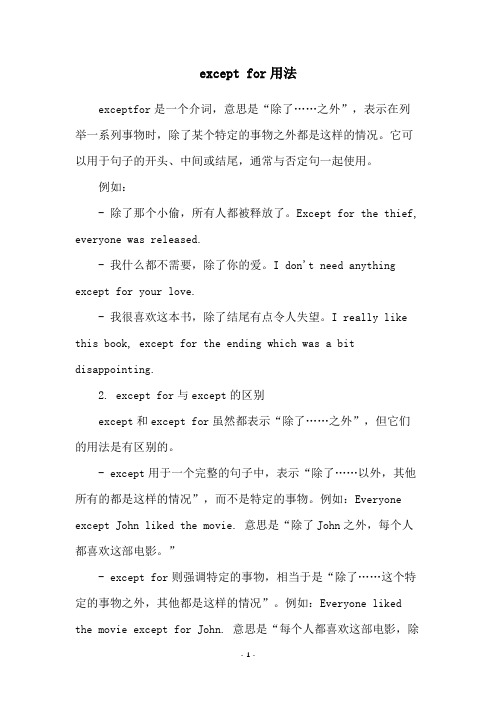
except for用法exceptfor是一个介词,意思是“除了……之外”,表示在列举一系列事物时,除了某个特定的事物之外都是这样的情况。
它可以用于句子的开头、中间或结尾,通常与否定句一起使用。
例如:- 除了那个小偷,所有人都被释放了。
Except for the thief, everyone was released.- 我什么都不需要,除了你的爱。
I don't need anything except for your love.- 我很喜欢这本书,除了结尾有点令人失望。
I really like this book, except for the ending which was a bit disappointing.2. except for与except的区别except和except for虽然都表示“除了……之外”,但它们的用法是有区别的。
- except用于一个完整的句子中,表示“除了……以外,其他所有的都是这样的情况”,而不是特定的事物。
例如:Everyone except John liked the movie. 意思是“除了John之外,每个人都喜欢这部电影。
”- except for则强调特定的事物,相当于是“除了……这个特定的事物之外,其他都是这样的情况”。
例如:Everyone liked the movie except for John. 意思是“每个人都喜欢这部电影,除了John。
”3. except for的常见句型除了用于否定句的句型外,except for还有一些常见的用法: - except for + 名词例如:- 除了这个问题,这个项目很成功。
Except for this problem, the project was a success.- 我很喜欢这个餐厅,除了价格有点贵。
I really like this restaurant, except for the prices being a bit high.- except for + 动名词例如:- 我每天都锻炼身体,除了周末。
besides,except,except for,except from区别例句
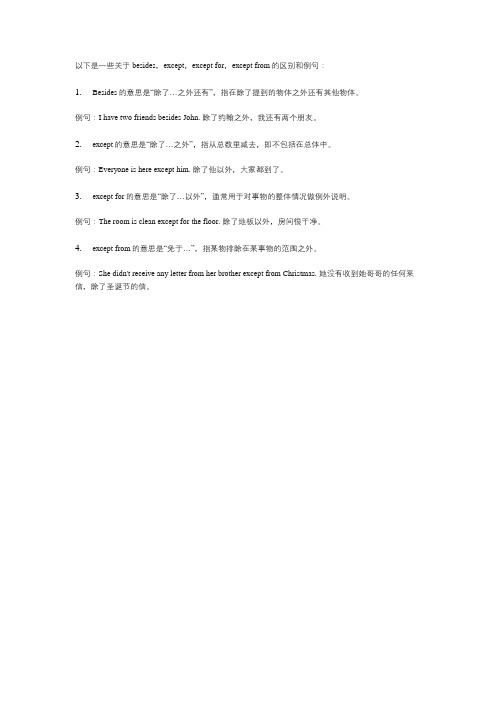
以下是一些关于besides,except,except for,except from的区别和例句:
1.Besides的意思是“除了…之外还有”,指在除了提到的物体之外还有其他物体。
例句:I have two friends besides John. 除了约翰之外,我还有两个朋友。
2.except的意思是“除了…之外”,指从总数里减去,即不包括在总体中。
例句:Everyone is here except him. 除了他以外,大家都到了。
3.except for的意思是“除了…以外”,通常用于对事物的整体情况做例外说明。
例句:The room is clean except for the floor. 除了地板以外,房间很干净。
4.except from的意思是“免于…”,指某物排除在某事物的范围之外。
例句:She didn't receive any letter from her brother except from Christmas. 她没有收到她哥哥的任何来信,除了圣诞节的信。
英语 except 和 except for的区别
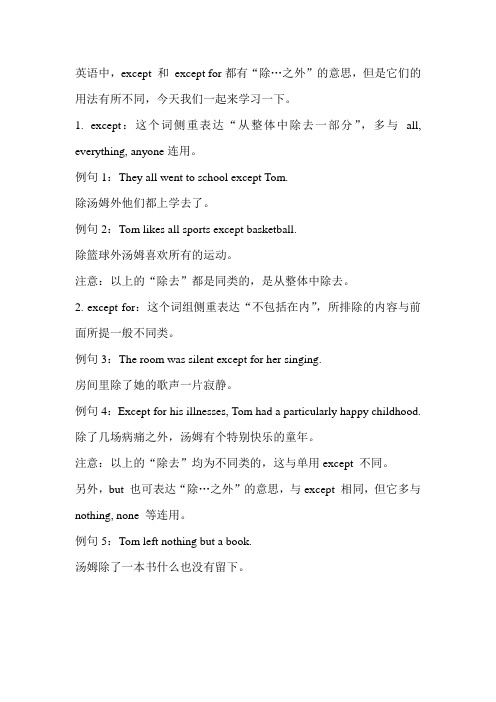
英语中,except 和except for都有“除…之外”的意思,但是它们的用法有所不同,今天我们一起来学习一下。
1. except:这个词侧重表达“从整体中除去一部分”,多与all, everything, anyone连用。
例句1:They all went to school except Tom.
除汤姆外他们都上学去了。
例句2:Tom likes all sports except basketball.
除篮球外汤姆喜欢所有的运动。
注意:以上的“除去”都是同类的,是从整体中除去。
2. except for:这个词组侧重表达“不包括在内”,所排除的内容与前面所提一般不同类。
例句3:The room was silent except for her singing.
房间里除了她的歌声一片寂静。
例句4:Except for his illnesses, Tom had a particularly happy childhood. 除了几场病痛之外,汤姆有个特别快乐的童年。
注意:以上的“除去”均为不同类的,这与单用except 不同。
另外,but 也可表达“除…之外”的意思,与except 相同,但它多与nothing, none 等连用。
例句5:Tom left nothing but a book.
汤姆除了一本书什么也没有留下。
except和except for的区别

except和except for一、except和except for都表示“除了”。
在all,every no,everything,anybody,nowhere这类词后面,两者都可用,后面跟名词或代词(后面是代词时,必须是宾格):——考点They all went to sleep except (for) Jim.除了吉姆他们都睡着了。
Everybody on me except (for) you.除了你谁都看不起我。
He ate the whole meal except(for)the beans.他把菜都吃了,除了豆子没吃。
We're all ready except (for) her).除了她我们都准备好了。
There's nobody I can trust except (for)him.除了他我谁都不信任。
(her——宾格,不能是主格she;只能用me,不能用I)——考点二、在其他情况下,只能用except for(可译为“除了……外):但用在all等词语前面时,只能用except for。
Except for John and Mary, nobody came.除了约翰和玛丽以外,谁也没有来。
三、except for一般用在名词短语前面。
l've cleaned the house except for the bathroom. 我已经把房子打扫了一遍.除了浴室以外。
The garden was empty except for one small bird. 花园里空荡荡的,只有一只小鸟。
四、介词和连词前面用except,不用except for.It's the same everywhere except in Scotland. 哪里都是一个样,除了在苏格兰。
五、在动词do后面,只能用except do sth. except+动词:He does nothing except eat. do…except+不带to的动词不定式是一个常用的结构。
except,exceptfor,besides区别
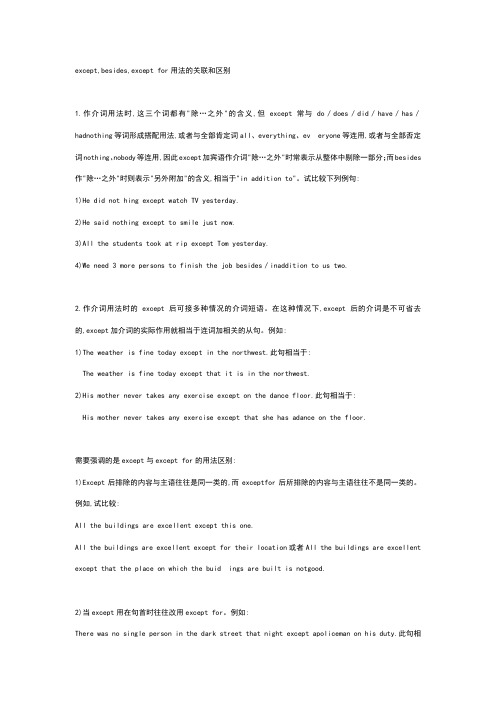
except,besides,except for用法的关联和区别1.作介词用法时,这三个词都有"除…之外"的含义,但except常与do/does/did/have/has/hadnothing等词形成搭配用法,或者与全部肯定词all、everything、ev eryone等连用,或者与全部否定词nothing、nobody等连用,因此except加宾语作介词"除…之外"时常表示从整体中剔除一部分;而besides 作"除…之外"时则表示"另外附加"的含义,相当于"in addition to"。
试比较下列例句:1)He did not hing except watch TV yesterday.2)He said nothing except to smile just now.3)All the students took at rip except Tom yesterday.4)We need 3 more persons to finish the job besides/inaddition to us two.2.作介词用法时的except后可接多种情况的介词短语。
在这种情况下,except后的介词是不可省去的,except加介词的实际作用就相当于连词加相关的从句。
例如:1)The weather is fine today except in the northwest.此句相当于:The weather is fine today except that it is in the northwest.2)His mother never takes any exercise except on the dance floor.此句相当于:His mother never takes any exercise except that she has adance on the floor.需要强调的是except与except for的用法区别:1)Except后排除的内容与主语往往是同一类的,而exceptfor后所排除的内容与主语往往不是同一类的。
except except for的区别
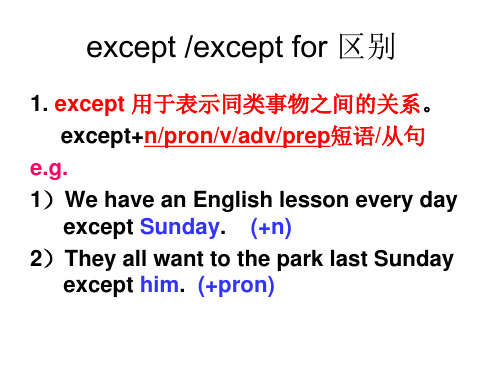
• 9. I have looked for my wallet 同类事物 except everywhere __________ here. except for • 10. I would join you __________ my 除非 headache. • 11. We can ask him for some advice at anytime _________ during his holidays. except except+介词短语 • 12. His composition is good, __________ some spelling mistakes. except for
except /except for 区别
1. except 用于表示同类事物之间的关系。 except+n/pron/v/adv/prep短语/从句 e.g. 1)We have an English lesson every day except Sunday. (+n) 2)They all want to the park last Sunday except him. (+pron)
• 5) He always goes to work by bike except recently. (+adv) • 6)After breakfast the students went nowhere except to school. (+prep短语) • 7)My father usually goes to work by bike except when it rains. (+从句) • 8) except 常用在all, whole, any, every, no, anything, anybody, anyone, everyone, everyhing, everybody等词之 后
except,except for,apart from,besides,but 的区别

except / except for / apart from / aside from / besides / but的区别1.except VS except for虽然except和except for都表示“除去…之外”或“不包括”的意思,但并不能任意互换。
(1)except for的后面只能接名词和名词短语,而except的后面既可以接名词、名词短语,也可以接从句、代词、副词、介词短语甚至动词。
• You are allowed to smoke everywhere except in the lobby.(接介词)你可以在除大堂以外的任何地方抽烟。
• She looked everywhere except here.(接副词)除了这里,她哪都看了。
• She didn’t do anything except watch TV.(接动词)[见(4)]昨天下午,除了看电视她什么都没做。
• He usually goes to work by bicycle except when it rains. (接从句)除了下雨的时候,他通常骑自行车去上班。
• The dish you cooked was great except that it could use more salt.(接从句)你做的这道菜很好吃,就是味道可以稍微再咸一点。
在上面的例句中,我们不能用except for来替代except,这是因为只有在except后面才能接从句,而except for后不能接从句。
我们只能在except for后加名词或名词短语。
• My manager loves my report except for the few mistakes I made.除了几个错误以外,我的经理觉得我的这份报告很好。
• The parrot is totally green except for its yellow wings.这只鹦鹉除了翅膀是黄色的以外其它地方都是绿色的。
except, except for, apart from和besides的区别
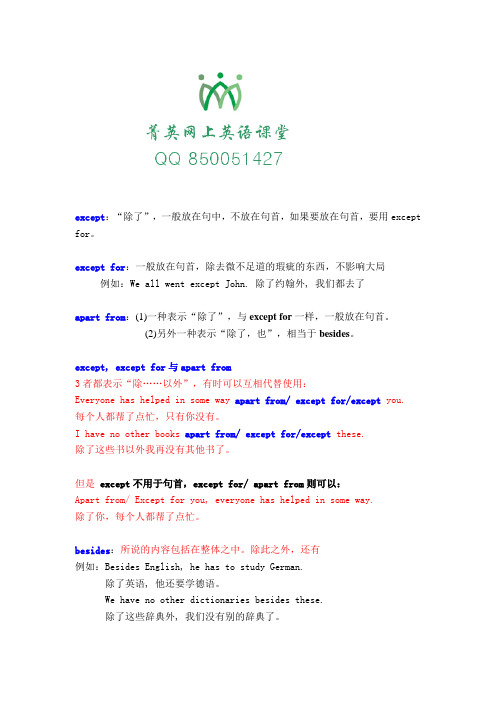
except:“除了”,一般放在句中,不放在句首,如果要放在句首,要用except for。
except for:一般放在句首,除去微不足道的瑕疵的东西,不影响大局例如:We all went except John. 除了约翰外, 我们都去了apart from:(1)一种表示“除了”,与except for一样,一般放在句首。
(2)另外一种表示“除了,也”,相当于besides。
except, except for与apart from3者都表示“除……以外”,有时可以互相代替使用:Everyone has helped in some way apart from/ except for/except you.每个人都帮了点忙,只有你没有。
I have no other books apart from/ except for/except these.除了这些书以外我再没有其他书了。
但是except不用于句首,except for/ apart from则可以:Apart from/ Except for you, everyone has helped in some way.除了你,每个人都帮了点忙。
besides:所说的内容包括在整体之中。
除此之外,还有例如:Besides English, he has to study German.除了英语, 他还要学德语。
We have no other dictionaries besides these.除了这些辞典外, 我们没有别的辞典了。
注意区分:except [ik'sept] 除…外expect [iks'pekt] 期待1.___being a little large the hat looks nice.2. He gets up early every day___Sunday.3. We need fifteen more people______our team to do the job.beside和beside s的区别beside 意为“在……旁边”、“和……相比”。
except、exceptfor、besides、but和apartfrom的区别你知道吗?

except、exceptfor、besides、but和apartfrom的区别你知道吗?⼀、except与except for区别(1) 在对象上的区别except主要⽤来谈论同⼀类的东西,⽽except for则主要⽤来谈论不同类的东西。
【例句】The room was very cold and, except for Jack, entirely empty.这个房间很阴冷,⽽且除了杰克,完全是空荡荡的。
本句中,前述对象是'房间',⽽除去的对象是'Jack',两者毫⽆关系。
We h Nobody like him,except his mother.除了他妈妈,没有⼈喜欢他Nobody 和mother是同类的,都是指⼈。
打开UC浏览器查看更多精彩图⽚(2) ⽤于句⾸时的区别在句⾸中只⽤except for,⽽不能⽤except。
【例句】Except for Jim, everyone went there.除吉姆外,⼤家都去了。
(3) 两者都可以使⽤或单独⽤当⽤于all, every, no, everything, anybody, nobody, nowhere, whole等表⽰概括性的词语后⾯时,两者可以⽤。
【例句】You couldn’t hear anything except (for) the noise of Louise typing.除了路易丝打字的声⾳外,你什么也听不到。
Except (for)John, the whole class passed the test.全班同学除约翰外,全都通过了考试。
当其前没有概括性词语时只能⽤except for。
【例句】The house was quiet except for the noise of Louise typing.除了路易丝打字的声⾳外,房⾥安安静静的。
打开UC浏览器查看更多精彩图⽚⼆、 besidesbesides表⽰⼀种累加的除外关系,意思是“除了什么之外,还有……”,强调'除此之外,还包括什么'。
exceptfor与except的区别是什么

except for与except的区别是什么except表示“除去,不包括”,强调所排除的“不包括在内”,一般表示同类之间的关系。
except for也表示“除…以外”,指对某种基本情况进行具体的细节方面的修正。
except for和except的区别(1)在意义上的区别except主要用来谈论同类的东西,而except for则主要用来谈论不同类的东西,在说明情况后作细节上的修正,有时含有惋惜之意。
(2)用于句首时的区别此时只用except for,不用except。
(3)两者可以互换的场合当用于all, every, no, everything, anybody, nobody, nowhere, whole等表示概括性的词语后面时,两者可互换。
如:You couldn’t hear anything except (for) the noise of Louise typing. 除了路易丝打字的声音外,你什么也听不到。
但是下面一句要用except for,因为其前没有上面提到的概括性的词语:The house was quiet except for the noise of Louise typing. 除了路易丝打字的声音外,房里安安静静的。
except for例句(1)Everyone was late, except for Richard. 除了理查德,其他所有人都迟到了。
(2)I sold everything I owned except for my car and my books 我把我所有的东西都卖掉了,只剩下汽车和书。
(3)Except for a patina of charisma, he was like a thousand other bright young men in Toronto.除了有点儿魅力外,他和多伦多其他众多机灵的年轻小伙子没有两样。
except、besides和except for等“除了”区别
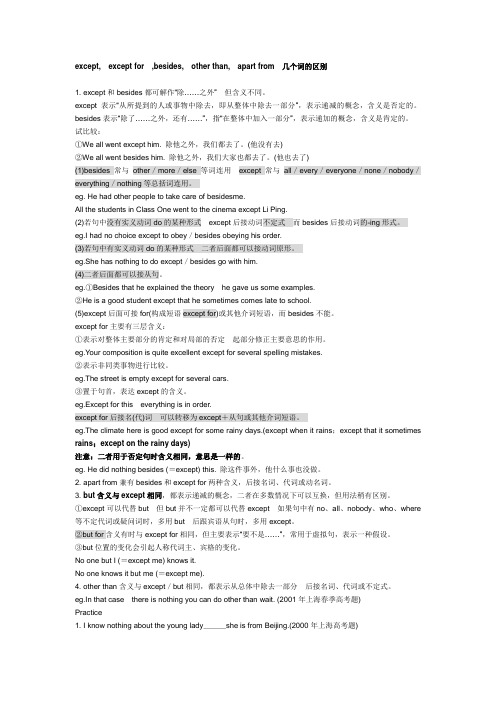
except, except for ,besides, other than, apart from 几个词的区别1. except和besides都可解作“除……之外”但含义不同。
except表示“从所提到的人或事物中除去,即从整体中除去一部分”,表示递减的概念,含义是否定的。
besides表示“除了……之外,还有……”,指“在整体中加入一部分”,表示递加的概念,含义是肯定的。
试比较:①We all went except him. 除他之外,我们都去了。
(他没有去)②We all went besides him. 除他之外,我们大家也都去了。
(他也去了)(1)besides常与other/more/else等词连用except常与all/every/everyone/none/nobody/everything/nothing等总括词连用。
eg. He had other people to take care of besidesme.All the students in Class One went to the cinema except Li Ping.(2)若句中没有实义动词do的某种形式except后接动词不定式而besides后接动词的-ing形式。
eg.I had no choice except to obey/besides obeying his order.(3)若句中有实义动词do的某种形式二者后面都可以接动词原形。
eg.She has nothing to do except/besides go with him.(4)二者后面都可以接从句。
eg.①Besides that he explained the theory he gave us some examples.②He is a good student except that he sometimes comes late to school.(5)except后面可接for(构成短语except for)或其他介词短语,而besides不能。
except和except_for区别
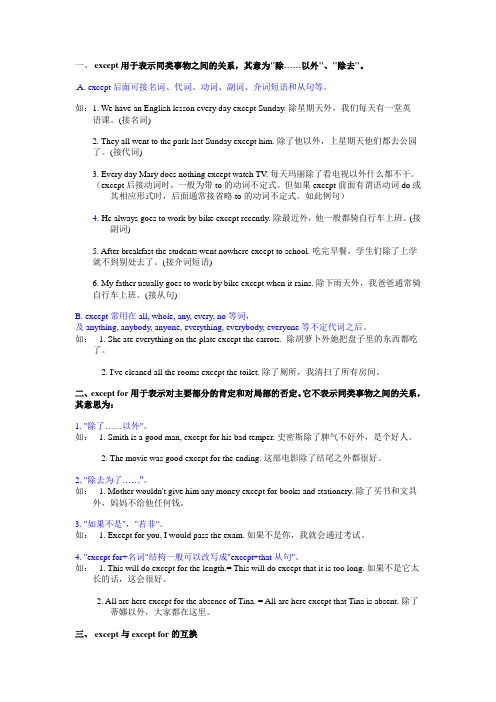
一、 except用于表示同类事物之间的关系,其意为"除……以外"、"除去"。
.A. except后面可接名词、代词、动词、副词、介词短语和从句等。
如:1. We have an English lesson every day except Sunday. 除星期天外,我们每天有一堂英语课。
(接名词)2. They all went to the park last Sunday except him. 除了他以外,上星期天他们都去公园了。
(接代词)3. Every day Mary does nothing except watch TV. 每天玛丽除了看电视以外什么都不干。
(except后接动词时,一般为带to的动词不定式。
但如果except前面有谓语动词do或其相应形式时,后面通常接省略to的动词不定式。
如此例句)4.He always goes to work by bike except recently. 除最近外,他一般都骑自行车上班。
(接副词)5. After breakfast the students went nowhere except to school. 吃完早餐,学生们除了上学就不到别处去了。
(接介词短语)6. My father usually goes to work by bike except when it rains. 除下雨天外,我爸爸通常骑自行车上班。
(接从句)B. except常用在all, whole, any, every, no等词,及anything, anybody, anyone, everything, everybody, everyone等不定代词之后。
如: 1. She ate everything on the plate except the carrots. 除胡萝卜外她把盘子里的东西都吃了。
except与except_for的区别
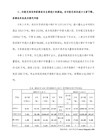
1. All of them went out for a walk ________ John.
A. besides B. except C. beside D. excepts
2. Everyone is here ________ Xiao Wang and me.
A. except B. besides C. beside D. excepts
需要强调的是except与exceptfor的用法区别:
1)Except后排除的内容与主语往往是同一类的,而exceptfor后所排除的内容与主语往往不是同一类的。例如,试比较:
All the buildings are excellent except this one.
All the buildings are excellent except for their location或者All the buildings are excellent except that the place on which the buidings are built is notgood.
⑨ I can answer all the questions except for the last one. 除了最后一题外,所有题目我都可以解答。
⑩ Your writing is good except for a few grammar mistakes. 除了几处语法错误外,你的作文写得很好。
A. except that B. except for
C. besides D. beside
析:Key: 1. A 2. B。因为除去的与保留的"不是同类项",故选except for。
except和except for的区别

except和except for的区别在英语中,except与except for均可表示“除……之外”的意思,两者在使用上也有所差异,本文详细介绍了它们之间的区别。
首先,使用except的地方通常比except for更加广泛。
Except 可以用作连接词,表示“但是,不包括”,例如:All the students were present except John.句话的意思是“所有学生都出席,除了约翰。
”另外,except也可以用作介词,表示“除了,除”,例如:All the students were present except for John.句话的意思是“所有学生都出席,除了约翰。
”其次,except for有着较为狭窄的使用范围,它只能用作介词,表示“除了,除外”,例如:Everyone was there except for John.句话的意思是“每个人都在那里,除了约翰。
”再者,except for有时表达的概念会比except更为广泛。
具体地说,except for表达的范围可以更多数量的概念,例如:They except for John went to the game.句话的意思是“他们(不仅仅是一个人,而是多个人)除了约翰之外,都去了比赛。
”总而言之,except和except for均可表示“除……之外”的意思,但它们在使用上是有差异的,except可以用作连接词与介词,而except for则只能用作介词。
并且except for表达的范围更为广泛,允许表达更多数量的概念。
此外,使用except的地方也更加广泛。
因此,想要正确使用except和except for,关键在于要熟记以上内容,严格按照语法规则去使用它。
exceptfor与except区别

exceptfor与except区别
except和except for的区别主要有:
1.在意义上的区别:except主要用来谈论同类的东西,而except for则主要用来谈论不同类的东西,在说明情况后作细节上的修正,有时含有惋惜之意。
2.用于句首时的区别:此时只用except for,不用except。
3.两者可以互换的场合:当用于all,every,no,everything,anybody,nobody,nothing,none,no one等表示概括性的词语后面时,两者可互换。
4.固定搭配:except for的后面只能接名词或名词短语。
My manager loves my report except for the few mistakes I made. 除了几个错误以外,我的经理觉得我的这份报告很好。
5.用法:当句子中使用的谓语是单词do的任何形式时,那么except的后面接动词原形,所表示的意思和but相同。
6.语义:两者都有“期望,期待”的意思,但接续不同。
except 后面可接名词、代词、动词、副词、介词短语和从句等。
except for 后面是加名词,有时候这个结构也可以改写成except+that从句。
总的来说,except和except for的区别在于它们的使用方式和语义重点不同。
具体使用时需要根据语境和表达需要选择合适的词语。
except-but-besides-except-for-区别

感谢您的阅读收藏,谢谢!
的整体词往往不是同类。如:
Your essay is well written except for
one or two minor grammatical
mistakes. 你的作文除了一两处小的语法
错误外,写得很好。(“作文”与“语法
错误”不是同类事物)
3
but
四、 but与except的用法基本相同并常互换使 用,但but多与no, nothing, not anything, nobody, nowhere, all, anything, who等词连 用,but所引出的事物常是句子的重心,有一 定的强调意味。如: They are all from the countryside but / except John. 除了约翰外,他们都来自乡下。
besides
• 一、besides 意为“除了……,(还, 也)”,表示的是追加关系,整体中包括 了“除了”的部分;
• Besides his wife, his daughter also went to see him. 除他妻子外,他女儿也去看过他。
1
except
二、except 意为“除了……,(其余的都)”, 表示的是剔除的关系, 整体中不包括“除了”的部分,except 除了后 面接名词、代词外,还可接介词短语或从句。
5
apart from
apart from在不同的上下文中,既有besides的含义, 又有except和except for的含义,要根据上下文来 判别。如:
Apart from English, he has a good command of French. 除英语外,他还法语。(= besides)
牛津英语Except,except for和excepting用法辨析
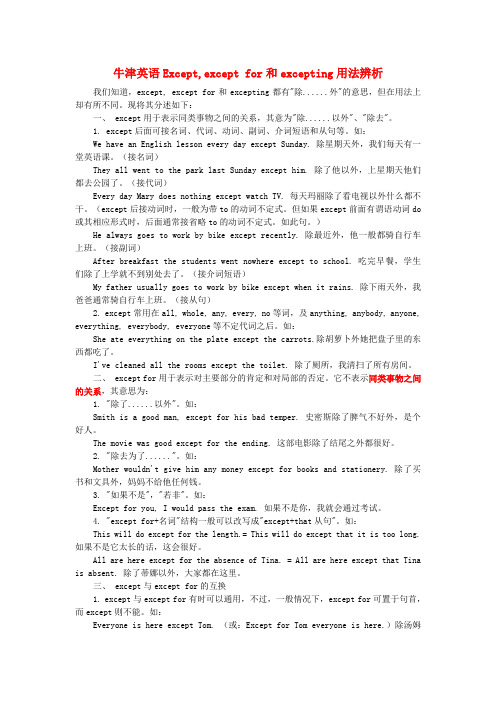
牛津英语Except,except for和excepting用法辨析我们知道,except, except for和excepting都有"除......外"的意思,但在用法上却有所不同。
现将其分述如下:一、 except用于表示同类事物之间的关系,其意为"除......以外"、"除去"。
1. except后面可接名词、代词、动词、副词、介词短语和从句等。
如:We have an English lesson every day except Sunday. 除星期天外,我们每天有一堂英语课。
(接名词)They all went to the park last Sunday except him. 除了他以外,上星期天他们都去公园了。
(接代词)Every day Mary does nothing except watch TV. 每天玛丽除了看电视以外什么都不干。
(except后接动词时,一般为带to的动词不定式。
但如果except前面有谓语动词do 或其相应形式时,后面通常接省略to的动词不定式。
如此句。
)He always goes to work by bike except recently. 除最近外,他一般都骑自行车上班。
(接副词)After breakfast the students went nowhere except to school. 吃完早餐,学生们除了上学就不到别处去了。
(接介词短语)My father usually goes to work by bike except when it rains. 除下雨天外,我爸爸通常骑自行车上班。
(接从句)2. except常用在all, whole, any, every, no等词,及anything, anybody, anyone, everything, everybody, everyone等不定代词之后。
- 1、下载文档前请自行甄别文档内容的完整性,平台不提供额外的编辑、内容补充、找答案等附加服务。
- 2、"仅部分预览"的文档,不可在线预览部分如存在完整性等问题,可反馈申请退款(可完整预览的文档不适用该条件!)。
- 3、如文档侵犯您的权益,请联系客服反馈,我们会尽快为您处理(人工客服工作时间:9:00-18:30)。
一、 except用于表示同类事物之间的关系,其意为"除……以外"、"除去"。
1. except后面可接名词、代词、动词、副词、介词短语和从句等。
如:We have an English lesson every day except Sunday. 除星期天外,我们每天有一堂英语课。
(接名词)They all went to the park last Sunday except him. 除了他以外,上星期天他们都去公园了。
(接代词)Every day Mary does nothing except watch TV. 每天玛丽除了看电视以外什么都不干。
(except 后接动词时,一般为带to的动词不定式。
但如果except前面有谓语动词do或其相应形式时,后面通常接省略to的动词不定式。
如此句。
)He always goes to work by bike except recently. 除最近外,他一般都骑自行车上班。
(接副词)After breakfast the students went nowhere except to school. 吃完早餐,学生们除了上学就不到别处去了。
(接介词短语)My father usually goes to work by bike except when it rains. 除下雨天外,我爸爸通常骑自行车上班。
(接从句)2. except常用在all, whole, any, every, no等词,及anything, anybody, anyone, everything, everybody, everyone等不定代词之后。
如:She ate everything on the plate except the carrots.除胡萝卜外她把盘子里的东西都吃了。
I've cleaned all the rooms except the toilet. 除了厕所,我清扫了所有房间。
二、 except for用于表示对主要部分的肯定和对局部的否定。
它不表示同类事物之间的关系,其意思为:1. "除了……以外"。
如:Smith is a good man, except for his bad temper. 史密斯除了脾气不好外,是个好人。
The movie was good except for the ending. 这部电影除了结尾之外都很好。
2. "除去为了……"。
如:Mother wouldn't give him any money except for books and stationery. 除了买书和文具外,妈妈不给他任何钱。
3. "如果不是","若非"。
如:Except for you, I would pass the exam. 如果不是你,我就会通过考试。
4. "except for+名词"结构一般可以改写成"except+that从句"。
如:This will do except for the length.= This will do except that it is too long. 如果不是它太长的话,这会很好。
All are here except for the absence of Tina. = All are here except that Tina is absent. 除了蒂娜以外,大家都在这里。
三、 except与except for的互换1. except与except for有时可以通用,不过,一般情况下,except for可置于句首,而except则不能。
如:Everyone is here except Tom. (或:Except for Tom everyone is here.)除汤姆外,大家都到了。
2. except与except for在句中也可互换。
一般来说,否定句中用except,肯定句式可以用except for来替换。
如:This article has no blunders except a few mistakes.这篇文章除了一点小错外没有大错。
此句可改为:This article is instructive except for a few blunders. 这篇文章除了有些错误外,是有教育意义的。
不过,在前后有相称的同类词语时,应用except,否则用except for。
如:We come to school every day except Sunday. 除星期天外,我们天天上学。
(句中every day与Sunday同类)This dress is ready except for the buttons. 衣服做好了,只是钮扣未缝上。
(句中ready与buttons不同类)四、 excepting是由动词转化而来的分词介词,用法较正式,含有较强的动态意味,意为"把……除外",与except在用法上有不同之处:1. 可用于句首,或用于not, without, always等词后;2. 其后常常用名词或代词。
如:Bruce answered all the questions excepting the last one. 除了最后一个问题外,布鲁斯都答出来了。
Excepting Sundays, the library is open daily. 除了星期天外,图书馆天天开放。
I think we must keep improving our English not excepting those who have mastered it. 我认为我们必须不断提高我们的英语水平,对那些已掌握了英语的人也不例外。
All the people in my family go to work every day, always excepting my youngest sister. 我家所有的人每天都上班,除了我那个最小的妹妹以外。
巩固练习:用except, except for或excepting填空。
1. She usually goes to work on her bike ________ when it rains.2. The whole staff, not ________ the heads of departments, went to the playground.3. His account is correct ________ that some details are omitted (省略,遗漏).4. The office is empty ________ Alice.5. I would go ________ it's too late.6. All the essays are good ________ John's.7. Everybody must study, ________ those who have a better grasp of Marxism.8. The wall was bare ________ a map of the world.9. I have looked for my wallet everywhere ________ there.10. I would join you ________ my headache.11. We can ask him for some advice at any time ________ during his holidays.12. His composition is good, ________ some spelling mistakes.13. John wasn't remembered, ________ by some of us who had known him.14. There was silence in the room, ________ the tick of the clock on the wall.15. The pair of trousers fits me well ________ the waist of it is a little too small.Key:1. except2. excepting3. except4. except for5. except6. except7. excepting8. except for9. except 10. except for 11. except 12. except for 13. except 14. except for 15. except中秋节主题班会教案设计一、活动目的:1、中秋节是中国的传统节日,通过中秋节让学生初步理解中国传统节日中所蕴涵的文化内核,真正了解节日,了解中国传统文化,帮助青少年增强科学节日文化理念,弘扬创新节日文化。
2、介绍中秋节的来历,了解中国各地过中秋的风俗。
3、增强学生爱父母爱家乡爱祖国的感情,让节日真正给我们带来快乐与幸福。
二、活动时间:xxxx年9月17三、活动准备:苏轼的《水调歌头》ok带、中秋灯谜、图画、月饼四、活动地点:六(1)班教室五、活动过程:老师导入:中秋节,是中国的传统节日。
从去年开始,国家把这个节日定为法定节日,休息一天。
从而可以看出,中国逐渐对传统文化和民俗越来越重视。
今天我们一起来走进中秋佳节,一起来感受中秋佳节。
一、中秋节的来历和风俗1、中秋节的由来(1)老师:队员们?每当天气晴朗的夜晚,天空上有什么?月亮像什么?(有月亮。
月亮像玉盘、像圆饼。
)(2)、出示圆形月饼,让学生比较。
老师:月亮在最圆的时候是什么日子?(每个月的十五日左右。
)(3)、说中秋节的由来。
老师:谁知道中秋节的来历?(4)、小结:队员们都说得很好,八月十五中秋节的时候月亮圆满,象征团圆,所以也叫团圆节。
它起源于魏晋时期,在唐朝初年成为我们国家固定的节日,这也是我国仅次于春节的第二传统节日。
中秋的另一个说法是:农历八月十五这一天刚好是稻子成熟的时刻,每家都拜土地神,中秋可能是秋报的遗俗。
2、中秋节的传说与民间故事(1)老师引:中秋节在我们中国人眼里,可是非常重要的佳节。
“月圆人团圆”,那是一个温馨和谐、及富诗情画意的节日。
